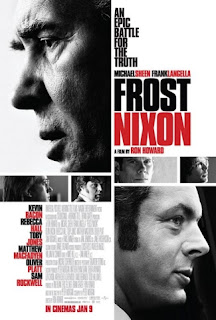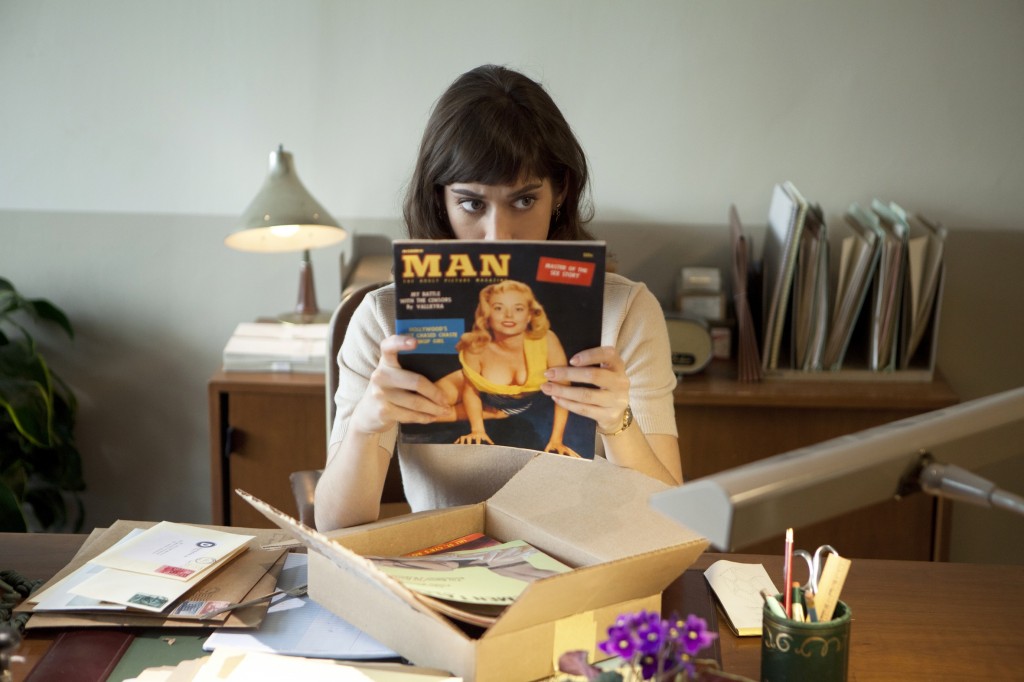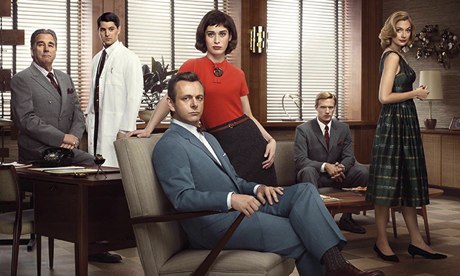 |
| Men will be Men: Frost/Nixon |
This is a guest post from Stephanie Brown.
Frost/Nixon
is a movie about male power as it looked in 1977. Starring Frank Langella as Richard Nixon and Michael Sheen as David Frost, the story recounts the efforts of David Frost, a television talk show host from Great Britain, to interview former president Richard Nixon, then living in disgrace and exile in his “Western White House” in San Clemente, California. The movie is based on a stage play by Peter Morgan, which debuted in 2006 in London; Langella and Sheen were the debut actors in that production. Directed by Ron Howard,
Frost/Nixon was a critical and financial success when it was released in 2008, and was nominated for five Academy Awards, including Best Picture, Best Director and Best Actor for Frank Langella’s performance.
Frost/Nixon is the story of two men who have lost power and whose lives have become claustrophobic and small. Frost and Nixon have much to gain by using each other—each sorely needs credibility and needs the other’s help to regain it.
The plot of the movie is simple: it recounts Frost’s efforts to obtain an interview with Richard Nixon, who had remained silent and incommunicado after his historic resignation on August 9, 1974, and the short and strange relationship they had while filming the interview. Nixon remains the only American president to resign from office, and did so because of his involvement in the Watergate break-in and cover-up, which revealed the efforts of the Committee to Re-Elect the President (also known as CREEP) to sabotage the efforts of the Democratic Party and its candidate George McGovern. The Watergate scandal also revealed that the President taped all his conversations, that some potentially incriminating conversations were missing from these tapes, and the conversations revealed the president to be a nasty, ruthless, and uncouth person. Many allies and aides in the White House were eventually implicated in the scandal, and the nation watched and read about it as more was revealed every day in newspapers, magazines, and in the televised Watergate hearings.
In Frost/Nixon, David Frost is at a nadir in his career. A formerly popular television talk show host who is fond of parties, power and fame, he is in the process of losing it all. His talk shows in the U.S. and in Australia have been cancelled, and he’s also lost “his table at Sardi’s,” a perk of his fame that he cherishes. A raconteur and jet-setter, he’s considered an intellectual lightweight, even a joke. While in the first class cabin on his flight to the U.S. to meet with Nixon, he encounters Caroline Cushing (Rebecca Hall), a beautiful and beguiling international beauty from Monte Carlo, who lets him know just how much of a punch line he has become. She rattles off several caustic comments that have been made by the press about his career and even his personal style.
After this, however, they are together for the rest of the film, and she is the kind of woman who enters the room softly (looking gorgeous in a series of halter dresses), retreats quietly, knows how to say the right thing in support of him, and makes a presentable companion. The only woman in the movie save for a brief scene with Pat Nixon (Patty McCormack) and the silent presence of Diane Sawyer (Kate Jennings Grant), who was a Nixon team member,Charlotte is a goddess amidst the power-jockeying of the mortal men around her. Upon meeting her, Nixon remarks to Frost that he ought to marry her, not because she’s lovely but because she lives in Monte Carlo and “those people pay no taxes.” Is Nixon trying to be witty here? As played by Langella, he is too much of a galoot, too artless, to try for wit, and it seems wholly believable. Langella captures the awkwardness and oddness of Nixon, in both his speech and stiff, stooped body.
Frost seeks the interviews with Nixon as a way to get back on top with this coup of an interview; the problem is that no one is really interested in financing it, but he proceeds anyway, gambling on the idea that the show will be bought when all is said and done, and he will recoup the considerable amount of money he’s invested in the project, including a check for $200,000 that he’s written to Nixon for the interviews. As played by Michael Sheen, Frost has good manners and plenty of English self-deprecation and modesty, even as he is shown to be a dandy and someone perfectly comfortable in posh surroundings. He flits in and out of the Plaza Hotel in New York and the Beverly Hilton in Los Angeles, after schmoozing on white push-button phones. I remember watching the David Frost Show as a kid, and even I remember him being a little more pompous than he’s portrayed here. Finding himself at a vulnerable time in his life, he’s humbled by failure and from hearing the truth about his reputation, not only from Caroline, but from the two researchers who have come to help him prepare questions for the interview, Bob Zelnick (Oliver Platt) and James Reston, Jr. (Sam Rockwell), who are a PBS journalist and academic, respectively. Each possesses serious bona fides, and risk losing it if they are involved in a bogus and lightweight interview.
Assisted by Frost’s aide John Birt (Matthew Macfadyen), the three are shown working together in a comfortable camaraderie, with Reston agitating for harder attacks on Nixon in the interviews than Frost is comfortable with. Parallel with Birt, Nixon also has an aide de camp and defender, Jack Brennan, who is a true believer in Nixon and defends and protects him. Played somewhat tongue-in-cheek by Kevin Bacon, it’s as if his ROTC character from Animal House, Chip Diller, has grown up and achieved his Young Republican wet dreams. The supporting actors inhabit the characters believably and comfortably. Rockwell as Reston is especially effective in his talking head segments, where he conveys gravitas as well as the stubborn single-mindedness of the expert.
The movie belongs to Frank Langella, however, whose performance is a tour de force. The movie was filmed on the grounds and in some of the rooms of the Western White House (Casa Pacifica) in San Clemente, and he’s like a giant inhabiting a fairy tale cottage, barely able to stand up straight. The claustrophobic feel of these rooms as well as those of the tract house where the interviews are filmed, remind us that this once giant man of power and influence has shrunk, and he doesn’t fit in well in these more plebian surroundings. Ungainly and weird, full endless, meandering stories, he’s a deposed king who still expects to be deferred to, and he comes with courtiers who smooth over his tics and translate him to the world. Langella’s voice takes on the literal, even tone of Nixon’s, reflecting Nixon’s dogged and single-minded personality. The centerpiece of the movie is a soliloquy that Langella delivers as a drunken phone call to Frost where he reveals his innermost character: his is a personality built on lifelong resentments. Real or perceived, his dismissal by East Coast power brokers throughout his career will never be forgotten or forgiven. He tries to find a common ground between the two in their class differences, but Frost is too cautious to comment or let on that he might agree. This scene is hypnotic and fascinating, and even more so when it’s revealed later that Nixon had no memory of the conversation because he’s said it all while in a blackout from drinking.
Ron Howard’s direction is straightforward, a “style of no style” that allows the actors and story to shine, but it’s full of wit and sly humor, such as a scene in which an unwatched TV is playing the ubiquitous and silly television commercial of the 1970’s which depicted a tear-stained American Indian man canoeing through a polluted river. The costumes and art direction give us the wide lapels, shag carpet, black limousines and white phones of the era and they look normal; no one is making fun of past lapses in taste—indeed, they look like totems of power. Frost/Nixon is a movie full of men who are talking, standing, sitting, and walking through halls on the way to important meetings. Charlotte Cushing, Pat Nixon, and Diane Sawyer are not central players, either in the cast or in the drama of the story. This is right and fitting at a time when Martha Mitchell was deemed crazy for truth telling about Watergate, and was alleged to have been drugged in order to keep her quiet. It was a man’s world, and it is their power as well as their corruption depicted here.
Stephanie Brown is the author of two collections of poetry, Domestic Interior and Allegory of the Supermarket
and Allegory of the Supermarket . She’s published work in American Poetry Review, Ploughshares and The Best American Poetry series. She was awarded an NEA Fellowship in 2001 and a Breadloaf Fellowship in 2009. She has taught at UC Irvine and the University of Redlands and is a regional branch manager for OC Public Libraries in southern California. She grew up in the same area as Richard Nixon and lives in San Clemente, where the Western White House still stands at its southernmost shore.
. She’s published work in American Poetry Review, Ploughshares and The Best American Poetry series. She was awarded an NEA Fellowship in 2001 and a Breadloaf Fellowship in 2009. She has taught at UC Irvine and the University of Redlands and is a regional branch manager for OC Public Libraries in southern California. She grew up in the same area as Richard Nixon and lives in San Clemente, where the Western White House still stands at its southernmost shore.











